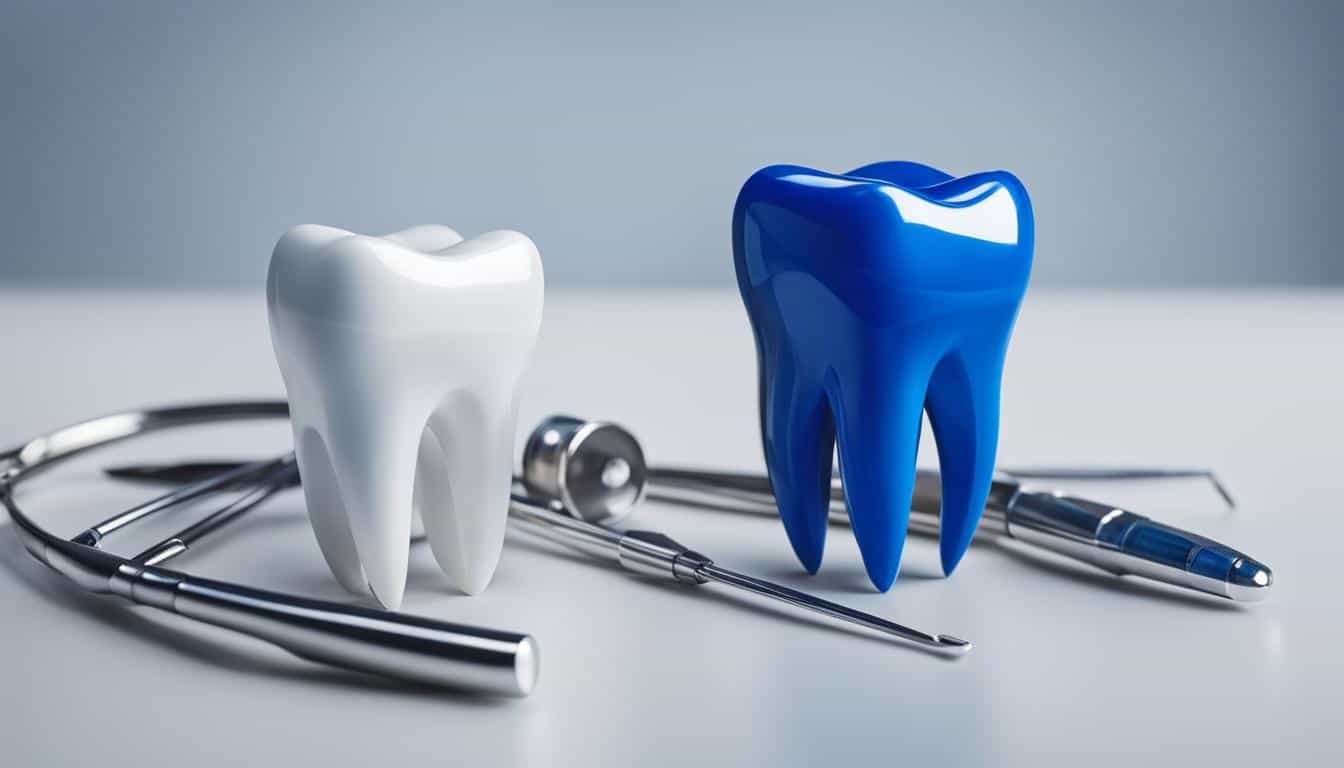As you age, dental health becomes increasingly important. Unfortunately, dental surgery can be expensive, and many seniors may have questions about whether Medicare covers these procedures. If you’re wondering whether your dental surgery will be covered by Medicare, read on to learn more.
Understanding what Medicare covers can help you make informed decisions about your dental health and avoid unexpected expenses. Keep in mind that while Medicare provides many essential health benefits, dental coverage is not typically included in Original Medicare.
Key Takeaways:
- Medicare does not typically cover dental surgery under Original Medicare.
- Supplementary plans, such as Medicare Advantage Plans and Medigap plans, may offer dental surgery coverage.
- It’s important to understand the limitations and criteria for coverage when considering dental surgery under Medicare.
- Medicare reimbursement can help with the financial aspects of dental surgery.
- Alternative sources of dental surgery coverage, such as dental discount plans and dental insurance policies, may be worth exploring if Medicare coverage is limited.
Medicare Coverage for Dental Services
Understanding Medicare’s coverage for dental services is critical. While Original Medicare generally does not include dental coverage, there may be other options available to you.
One option is a Medicare Advantage Plan (Part C) offered by private insurance companies. These plans often include dental coverage, although specific benefits and costs can vary. It is important to research and compare plans to ensure you choose one that meets your dental needs.
Another option is a Medicare Supplement Insurance plan (Medigap). These plans do not include dental coverage, but some may offer add-on options for dental services. You can compare Medigap plans through Medicare.gov’s online tool.
It is essential to note that even with supplementary options, Medicare’s coverage for dental services is limited. For example, Medicare typically does not cover routine dental exams, cleanings, or fillings.
Table: Medicare Coverage for Dental Services
| Dental Service | Medicare Coverage |
|---|---|
| Basic dental services (exams, cleanings, fillings) | Not covered under Original Medicare, may be covered under Medicare Advantage Plans or Medigap plans |
| Dental surgery (extractions, implants, etc.) | May be covered under certain Medicare Advantage Plans or Medigap plans |
| Dentures | Not covered under Original Medicare, may be covered under certain Medicare Advantage Plans or Medigap plans |
When considering dental surgery, it is important to understand the potential coverage limitations and criteria that may apply. We will explore these factors in more detail in the following section.

Medicare Supplement Insurance and Dental Surgery Coverage
If you are looking for additional coverage for dental surgery under Medicare, you may want to consider Medicare Supplement Insurance, also known as Medigap. While Medigap plans do not typically include dental coverage, some plans may offer add-on options for dental services, including dental surgery.
It’s essential to understand the specific Medigap plans and their dental surgery coverage options. Here is a breakdown of the ten standardized Medigap plans and their potential dental coverage:
| Medigap Plan | Potential Dental Coverage |
|---|---|
| Plan A | No coverage for dental surgery |
| Plan B | No coverage for dental surgery |
| Plan C | Potential coverage for emergency dental surgery |
| Plan D | No coverage for dental surgery |
| Plan F | No coverage for dental surgery |
| Plan G | No coverage for dental surgery |
| Plan K | No coverage for dental surgery |
| Plan L | No coverage for dental surgery |
| Plan M | No coverage for dental surgery |
| Plan N | No coverage for dental surgery |
As seen in the table above, only Plan C potentially covers emergency dental surgery. However, it’s important to note that Medigap plans have monthly premiums, and additional dental coverage options may come with added costs.
If you are looking for dental surgery coverage under Medigap, it’s crucial to compare plan options and costs carefully. Integrity Now Insurance Brokers can help you navigate your Medigap options and determine if dental coverage is suitable for you.
Medicare’s Coverage Limitations for Dental Surgery
While Medicare may cover some dental surgery procedures, it’s important to be aware of the coverage limitations and criteria that may apply. Understanding these limitations can help you avoid unexpected expenses and plan accordingly. Here are some of the coverage limitations to keep in mind:
- Medicare Part A and Part B do not typically include coverage for routine dental care, such as cleanings and fillings.
- Medicare may cover dental surgery deemed medically necessary, such as oral surgery related to a covered illness or injury. However, cosmetic procedures or dental surgery solely for the purpose of improving appearance are not covered.
- Even for medically necessary dental surgery, Medicare may only cover a portion of the expenses. You may be responsible for deductibles, copayments, and coinsurance.
- Medicare may require pre-authorization or other approval processes before covering certain dental surgery procedures. Be sure to check with your healthcare provider and Medicare before undergoing any dental surgeries.
It’s also important to note that coverage limitations can vary depending on your specific Medicare plan and the state you reside in. Therefore, it’s important to consult with your healthcare provider and Medicare to fully understand the coverage limitations that apply to your individual situation.
Example:
“Medicare covered my recent oral surgery, but I had to pay a copayment and coinsurance. It’s important to understand that even if Medicare covers a procedure, you may still have out-of-pocket expenses.”

Medicare Reimbursement for Dental Surgery
If you have received dental surgery under Medicare, you may be eligible for reimbursement of your expenses. Medicare reimbursement for dental surgery works differently depending on the type of Medicare plan you have.
If you have Original Medicare (Part A and Part B), dental surgery reimbursement is typically only available if the procedure is deemed medically necessary. In this case, Medicare may reimburse a portion of your expenses according to the Medicare-approved amount. It’s essential to keep in mind that you will still be subject to any applicable deductibles, coinsurance, and copayment amounts.
On the other hand, if you have a Medicare Advantage Plan, your dental surgery reimbursement options may be broader. Many Medicare Advantage Plans offer additional dental benefits, including coverage for dental surgery services. These plans may cover a percentage of your expenses or have a set copayment or coinsurance amount, depending on the specific plan.
When submitting a claim for dental surgery reimbursement, you will need to provide documentation of the services rendered, including the type of procedure and the associated costs. Your healthcare provider can assist you in submitting the necessary paperwork and documentation to Medicare or your Medicare Advantage Plan provider.
Example of a Medicare Reimbursement Table for Dental Surgery Expenses
| Dental Surgery Procedure | Medicare Reimbursement Rate |
|---|---|
| Tooth Extraction | $83.69 |
| Root Canal | $549.09 |
| Implant Placement | $1,498.94 |
It’s important to note that this table is for illustrative purposes only and does not reflect the exact amounts that Medicare may reimburse for dental surgery procedures. The reimbursement rates may vary depending on factors such as the location of the service, the healthcare provider’s fees, and the individual plan’s terms and conditions.
Ultimately, it’s essential to understand your Medicare coverage for dental surgery, including any reimbursement options available to you. If you have any questions or concerns, be sure to consult with your healthcare provider or Medicare representative.

Sample Table: Comparing Dental Coverage Options
| Dental Discount Plan | Standalone Dental Insurance Policy | |
|---|---|---|
| Cost | $100-$200 per year | $20-$50 per month |
| Coverage | Discounts on dental procedures, including surgery | Comprehensive coverage for a range of dental services |
| Limitations | No deductibles or coverage limitations, but may have restrictions on participating providers | Premiums, deductibles, coverage limitations, and waiting periods for some services |
Understanding Dental Surgery Expenses under Medicare
If you’re considering dental surgery under Medicare, it’s important to understand the potential expenses involved. While coverage may vary depending on your specific plan, there are certain common costs you should be aware of.
Dental Surgery Procedure Costs
The cost of the actual dental surgery procedure can vary widely depending on the complexity and length of the surgery. According to CostHelper Health, the cost for a single dental implant can range from $1,000 to $3,000 or more, while a tooth extraction can cost $75 to $450 per tooth. Your Medicare coverage may only cover a portion of these costs, leaving you responsible for the remainder.
Out-of-Pocket Costs
Even if Medicare covers a portion of your dental surgery expenses, you may still be responsible for certain out-of-pocket costs. This can include copayments, deductibles, and coinsurance. These costs can vary widely depending on your specific Medicare plan and the coverage options you’ve selected.
Supplemental Dental Coverage
If you have supplemental dental coverage through a Medicare Advantage Plan or Medigap policy, you may be able to reduce or eliminate some of these out-of-pocket costs. Be sure to carefully review your policy to understand what’s covered and what you’ll be responsible for paying.
Travel Expenses
If you need to travel to a different location for your dental surgery, you may incur additional expenses such as transportation, lodging, and meals. These costs can add up quickly and may not be covered under your Medicare plan.
Understanding the potential expenses involved in dental surgery under Medicare can help you make informed decisions about your dental health. Be sure to review your plan carefully and consider any supplemental coverage options that may be available to you. Additionally, talk to your dental provider to get a clear understanding of the costs involved and any out-of-pocket expenses you may be responsible for.

Conclusion
Understanding Medicare’s coverage for dental surgery is essential to your overall health and financial well-being. While Medicare Part A and Part B typically do not cover dental services, there are supplementary options to explore, including Medicare Advantage Plans and Medicare Supplement Insurance.
It’s important to be aware of the potential coverage limitations and criteria, as well as the reimbursement process for dental surgery expenses. If Medicare does not fully cover your dental surgery expenses, there are other options to consider, such as dental discount plans and dental insurance policies.
At Integrity Now Insurance Brokers, we understand the complexity of Medicare coverage and can provide personalized guidance and support to help you navigate your options. Contact us today to learn more and ensure you have the coverage you need for your dental health.
FAQ
Does Medicare cover dental surgery?
Medicare Part A and Part B (Original Medicare) typically do not include coverage for dental surgery. However, there may be certain exceptions and supplementary options available.
What is the coverage for dental services under Medicare?
Medicare’s overall coverage for dental services is limited. While Original Medicare does not usually include dental coverage, you may have alternative options such as Medicare Advantage Plans or Medicare Supplement Insurance to consider.
Can dental surgery be covered by Medicare Advantage Plans?
Medicare Advantage Plans, also known as Part C, may offer additional benefits beyond Original Medicare, including dental coverage. It is important to review the specific details of your Medicare Advantage Plan to determine if dental surgery procedures are covered.
Is dental surgery covered by Medicare Supplement Insurance?
Medicare Supplement Insurance, also known as Medigap, is designed to fill the gaps in coverage left by Original Medicare. While Medigap plans do not typically include dental coverage, there may be add-on options available for dental services, including dental surgery.
What limitations does Medicare have for dental surgery coverage?
Medicare’s coverage for dental surgery may have limitations and restrictions. It is important to understand the criteria and requirements that may apply when considering dental surgery under Medicare or supplemental plans.
How does Medicare handle reimbursement for dental surgery expenses?
Medicare reimbursements for dental surgery expenses depend on the specific circumstances and coverage options. It is advisable to consult with Medicare or your supplemental plan provider to understand the reimbursement process and requirements.
Are there alternative options for dental surgery coverage if Medicare does not fully cover it?
If Medicare does not provide sufficient coverage for dental surgery expenses, there are alternative options to consider. These may include dental discount plans or dental insurance policies that specifically cover dental surgery procedures.
How can I navigate dental surgery expenses under Medicare?
Dental surgery expenses can vary, and understanding coverage options is essential. In this regard, exploring supplementary plans, reimbursement options, and consulting with healthcare professionals or insurance brokers can help navigate dental surgery expenses under Medicare.










